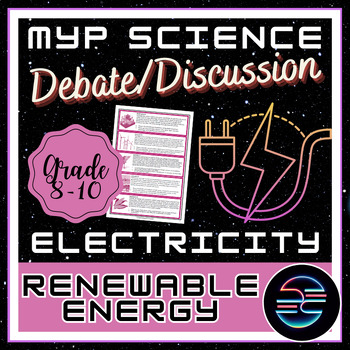Renewable Energy Discussion - Electricity - Grade 8-10 MYP Middle School Science
- Zip
Also included in
- 6 units worth of grade 8-10 debate / discussion activities, perfect for developing collaboration and critical thinking skills all year long, bundled at 10% off! Designed with MYP in mind but appropriate for any middle school, high school, international, or homeschool STEM curriculum.In each activityPrice $13.50Original Price $15.00Save $1.50
Description
Get your middle school science class talking with this physics / environmental science discussion activity on renewable power sources, recommended for grade 8-10 students learning about electricity! Designed with MYP in mind but appropriate for any middle school, high school, international, or homeschool STEM curriculum.
Students explore 5 hypothetical scenarios while applying their knowledge of renewable and non-renewable resources, energy, and generating electricity. With strong environmental science connections, this activity can also be used as an interdisciplinary resource. Which renewable energy sources are the key to a clean future? Print and share or use the included slides for a paperless digital experience. Can be used as a formative assessment to check for understanding or as a summative assessment using the included MYP rubrics (criteria A and D).
Get the Electricity unit plan associated with this activity here.
Want to try before you buy? Download the FREE Universal Healthcare Debate and see if it's right for you and your students.
Includes the following:
- Discussion handouts and slides in PDF and PowerPoint formats
- Teacher notes for simple guidance and implementation
- Differentiated digital rubrics (criteria A and D) for MYP years 1-5 (grades 6-10)
You might like this resource if you...
- Teach MYP science or a similar international science curriculum
- Are a homeschool parent/teacher looking for engaging discussion or debate topics
- Want a low-prep formative/summative assessment task
- Want to improve student collaboration and communication skills
Follow me to receive product updates and FREE monthly teaching resources!
Connect with me:
Blog - https://www.scienceforeveryone.me/
Facebook - https://www.facebook.com/science4every1/
Instagram - https://www.instagram.com/sci4every1/
LinkedIn - https://www.linkedin.com/in/jesse-versluys-bb342a86/
Pinterest - https://www.pinterest.com/sci4every1
Youtube - https://www.youtube.com/channel/UCuUcq_UYIczNm1JaFLGwxkA
Earn Free TpT Credits!
Leave feedback on your purchases to earn free TpT Credits that can be used on future purchases. Just visit My Purchases and click on Provide Feedback to leave a review and earn TpT credits.






